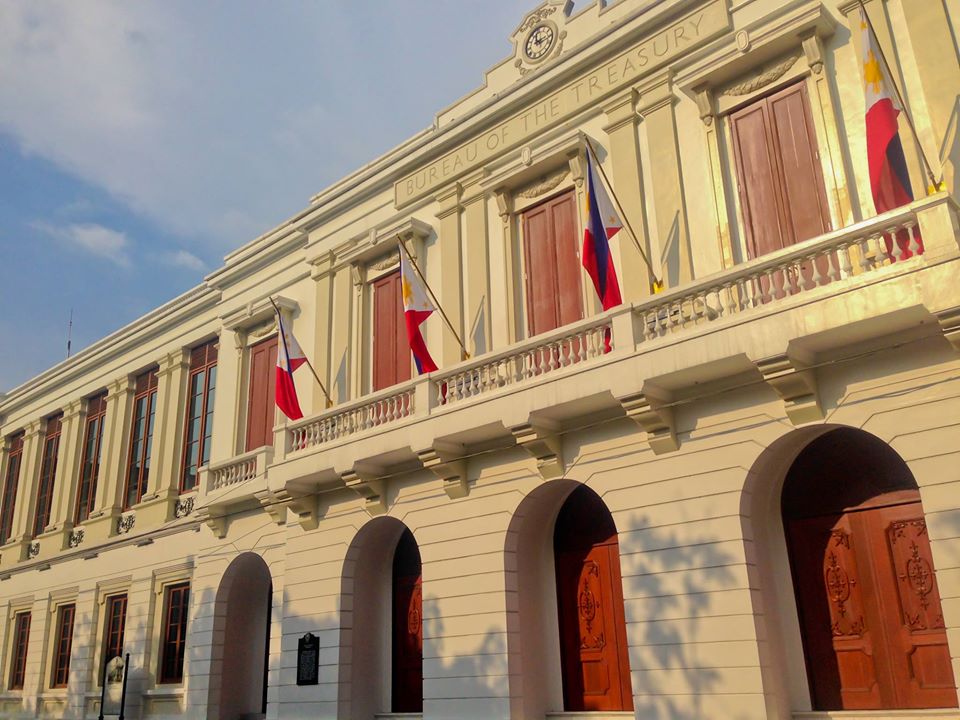As markets demand ‘an arm and a leg’, BTr partially awards T-bills

The Ayuntamiento de Manila which houses the Bureau of the Treasury (From the Facebook account of the bureau)
MANILA, Philippines—The Bureau of the Treasury on Monday (March 28) raised P5 billion—or only one-third of its P15-billion total offering—as it rejected bids for two tenors amid climbing rates.
The BTr fully awarded the 91-day tenor, even as its average rate further rose to 1.587 percent from 1.536 percent last week.
It declined tenders for P5 billion each in the 182- and 364-day debt paper.
Had bids for these IOUs been accepted, rates would have jumped to 1.856 percent (from 1.607 percent previously) for the six-month and 2.137 percent (from 1.792 percent) for one-year government securities.
“Market jitters continue with another round of oil price hikes and the US Federal Reserve’s aggressive tone,” National Treasurer Rosalia de Leon said. She noted that the Fed had hinted an increase in interest rates by 50 basis points (bps) to tame four-decade-high inflation in the US.
Article continues after this advertisementWhile elevated yields deter domestic borrowings, De Leon said “the recent success in the US dollar market strongly positions the BTr to meet disbursements even with rejections in auctions if markets demand an arm and a leg.” The Philippines borrowed a total of $2.25 billion through global bonds — including $1 billion via its maiden “green” bond issuance — last week.
Article continues after this advertisementGiven the experience in March wherein government securities eligible dealers (GSEDs) pitched high rates due to spillover risks to the global economy wrought by Russia’s invasion of Ukraine, De Leon said the BTr would offer bonds in the belly of the curve, or those with intermediate maturities of three to seven years, next month.
De Leon last week said that the BTr will launch an “amortizing bond” to assuage jittery local creditors bracing for yield pickup.
“As major central banks have either begun or hinted at a withdrawal of monetary policy easing in response to the emergence of global inflationary pressures, it is without question that we are already in the midst of transitioning towards higher domestic interest rates,” De Leon said during last Friday’s 17th PDS annual awards.
“Hence, one way to ensure financial stability is the introduction of new debt instruments, such as the amortizing bond format, which would cater to investors that are wary of duration exposure in an environment of climbing interest rates,” De Leon told domestic bond market participants.
In a text message to the Inquirer, De Leon said an amortizing bond will be the first of its kind in the Philippines’ government securities market. De Leon said the BTr has yet to set a date for the rollout of amortizing bond.
The website Investopedia defined an amortized bond as an IOU “in which the principal (face value) on the debt is paid down regularly, along with its interest expense over the life of the bond.” For regular bonds, the principal amount borrowed is settled in full upon maturity.
The Philippines relies more on locally sourced borrowings to take advantage of oozing liquidity in the financial system while tempering foreign exchange risks. Three-fourths of the P2.2 trillion that the government had programmed to borrow this year will come from domestic creditors, mainly through the issuance of treasury bills and bonds.
After tensions at the Ukrainian-Russian border escalated into a full-blown war in late February, the BTr fully rejected four-consecutive local fund-raising auctions as bid rates sought by government securities eligible dealers (GSEDs) skyrocketed.
As the ongoing Ukraine-Russia conflict also jacked up global oil and commodity prices, spillover impacts on domestic inflation made creditors jittery, such that the BTr had been capping rates to only partially award T-bills and bonds during the last two weeks.
In a speech also last Friday, Finance Secretary Carlos Dominguez III said the COVID-19 pandemic had forced the government to borrow more as “it would have been calamitous for the economy to allow public spending to drop as revenue flows tightened.”
“Without the pandemic, our gross borrowings from 2020 to 2022 would have averaged P1.4 trillion annually. Because of the public health emergency, our average annual borrowing increased to about P2.5 trillion,” Dominguez said.